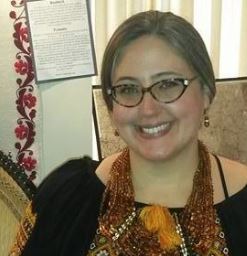
by Lisa Ryan
Pew has a new survey out about people who have chosen a new house of worship. I didn’t participate, but it sure is interesting to see where I fit in. My story: I grew up Roman Catholic, spent about 10 years as a None (atheist), started believing and going back to Catholic church for about a year or two, then checked out my first Orthodox Liturgy (and got hooked, and converted). There’s a backstory about why I became a None and then became religiously re-affiliated, but it is a long story involving studying philosophy: best for another time.
Reasons I left the Roman Catholic Church
Dislike of modern Mass: I felt like no one really understood what was being done or why, and that the emotional component to the ritual really was lost. I used to talk about how I wanted to attend the church you would read about in history books. I was never at a pre-Vatican II Mass, but from what I hear from older Catholics of my acquaintance, I’m not the only one who wishes Mass were more traditional.
Problems with certain social issues: I know a number of Catholics who would happily participate more deeply in the faith, but don’t because they are divorced (or parents out of wedlock, or gay, or etc.). I just couldn’t open my heart at a Church where a huge number of people were excommunicated and unable to be reconciled.
How I Found My Parish
In conversation with an Orthodox friend on Facebook: when he heard my complaints about how Mass was too modern, he told me to check out an Orthodox Liturgy. He attends a Ukrainian Orthodox parish and knew that there was at least one in my area, so I did a Google search for the Ukrainian Orthodox Church parish nearest me and the first hit was my parish: St. Peter & St. Paul Ukrainian Orthodox Church in Carnegie, PA.
Why I Kept Coming Back
 Liturgy! I love the Liturgy! It’s beautiful, traditional, and so much meaning is obvious in the ritual. I love that it is sung back and forth, priest and choir: it really feels like a shared labor (and even more so where there is congregational singing). I love that the priest serves at an altar behind a veil, and offers the worship the same way we do: facing God. As silly as it may seem (after all, God is everywhere), the orientation of Catholic priests serving Mass facing the congregation feels to me like it is being offered to the congregation instead of to God.
Liturgy! I love the Liturgy! It’s beautiful, traditional, and so much meaning is obvious in the ritual. I love that it is sung back and forth, priest and choir: it really feels like a shared labor (and even more so where there is congregational singing). I love that the priest serves at an altar behind a veil, and offers the worship the same way we do: facing God. As silly as it may seem (after all, God is everywhere), the orientation of Catholic priests serving Mass facing the congregation feels to me like it is being offered to the congregation instead of to God.
Iconography, and the embrace of the mystical. My parish has icons on all the walls, and the effect, when you aren’t really paying attention, is to see the Church Triumphant coming out of the walls/next world to participate with you in Liturgy. Statuary is a lot more like art, grounded entirely in the material world. I think the easiest way to learn the faith is through iconography, ritual, or mystical experience: there’s something very simple and obvious about lighting a candle or kissing an icon that makes real emotion follow the gesture, and that deepens belief. Too much ritual has been removed from Catholic worship, in my opinion, and what remains was not enough for me to anchor my belief on.
Welcoming parishioners. My parish welcoming committee is very loosely organized, but during my first Liturgy at least 5 people greeted me and told me to come to Coffee Hour afterwards. When I did, they were very friendly, and invited me back again. When I returned, people started to bring me the blessed bread (antidoron) after communion, and that touched my heart.
Why I Converted
I started learning about the Orthodox faith right away, and happily found much that I loved. The differences between Orthodoxy and Catholicism can seem quite small, but they were significant to me.
Theology of Sin: the conception of sin as missing the mark, the view of repentance as a renewed commitment to living the faith, the goal of theosis: generally, Orthodoxy seems to focus on doing better more than atonement for doing wrong, and I found that very helpful.
Greater economia in reconciling sinners to the community. The Orthodox permit divorce and remarriage, with generally limited periods of excommunication. Theologically, the Orthodox and the Catholics believe the same things about marriage (one marriage is best, between one man and one woman only, no premarital sex, etc.), but the acceptance of those who sin is quite different in practice than the Catholic Church I grew up in. This has changed so much in just the last couple of years, I hope it will not be a factor in conversions away from Roman Catholicism much longer.
Those in my community who really walk the walk. People at my parish are not perfect, and either am I, but a lot of those folks are really walking the walk, and I saw that right from the beginning.
I began attending during Lent on a year when both the Eastern and Western Churches celebrated Pascha together. I was telling one woman my plans to go home for Easter, and she said that if I changed my mind I was welcome to attend the Pascha service, and that she would share her basket with me. I mean no disrespect to any Roman Catholics I have met, but I was absolutely dumbfounded that she was offering to share her Easter dinner with a total stranger. I knew I wanted that living faith that she had. That Easter was my last time taking communion at a Roman Catholic church, and when I came back I told my priest that I wanted to convert to Orthodoxy.
Why Converting Matters So Much to Me:
Orthodox practice and worship really deeply inform my belief, and I can’t imagine trying to walk in the Way without my Church. I need the mystical and the church of five senses, I need the saints and the Church Fathers, I need two millennia of Tradition, I need all the customs/”little-t” traditions and the comfortable repetition of the calendar so I can learn and apply this stuff a bit at a time.

There is much to like here, as the general arc of the story seems right. But I’m not sure what Lisa means by “inclusive of … gay, sexually active singles, etc.”
If she means that no recurrent sin excludes a repentant sinner from the Church, great.
If she means that her parish communes unrepentant sinners (“gay” continues to be used equivocally; I once referred to “sexually active gays” and was greeted with an incredulous “what do you think it *means* to be gay?”), not so great — on several levels, including the suggestion that parishioners know things that only the Priest should know.
My bottom-line concern is that we not present the Orthodox Church as a place to come if you don’t want to repent of your sins but do want full sacramental communion.
readerjohn, knowing that sexually active gays are not permitted to receive Communion, let’s give her the benefit of the doubt that what she meant was that all repentant sinners are welcome, and not simply excluded carte blanche. If her parish does commune unrepentant sinners, then that is a place to AVOID. That priest has a lot to answer for, and the bishop as well.
I’m going to assume the parish is actually Orthodox doing things that Orthodox parishes do.
I liked what I read Lisa, (my friend Deanna recommended this post to me), but gosh, the above comments are exactly what I heard in the Roman Catholic Church… 🙂
Fresca: What are the ‘exact comments’ you heard in the Catholic Church? Can you be specific? Thanks.
Orthodox condemn sex outside of marriage and all homo sexual activities. Just like Catholic Church.
This concerns me. As a Catholic who’s interested in Orthodoxy, I would hope all Orthodox jurisdictions condemn homosexual behaviors as well as other aberrant sexual practices. If this is not the case, then………?????
Don’t be concerned. All Orthodox Churches condemn all sexual activity outside of traditonal marriage.